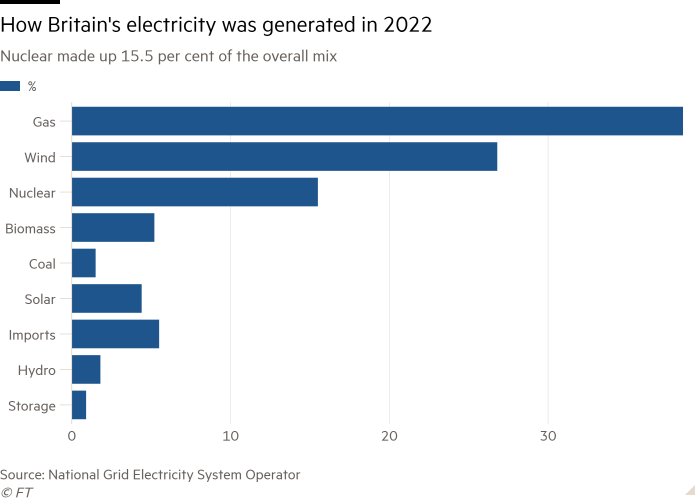Ministers are under pressure to launch a government agency to develop a new fleet of nuclear reactors in Britain “as a matter of a priority”, after delays caused by a funding dispute between the Treasury and business department.
UK engineering giant Rolls-Royce, US nuclear power group Westinghouse, the trade union Prospect and several cross-party MPs have written a letter to the government calling for the urgent launch of Great British Nuclear (GBN).
The new body was promised by former prime minister Boris Johnson last year when, in the months following Russia’s invasion of Ukraine, he set a goal of 24 gigawatts of nuclear power capacity by 2050.
This target was intended to meet a quarter of the UK’s projected electricity demand and bolster domestic energy security. Britain at present has 5.88GW of nuclear capacity.
GBN is intended as a delivery body with the funding to develop new nuclear power projects and help them get to a point where the government and investors can make a final investment decision and start construction.
Successive governments dating back to Margaret Thatcher’s administration in the late 1970s have promised large new fleets of new nuclear power stations but those ambitions have gone unfulfilled because of the costs and complexities of atomic energy, which have often driven private companies away from potential projects.
Nuclear power also remains heavily contested by environmental groups that argue it is expensive and leaves a legacy of highly toxic waste.
Nuclear power companies and trade unions hope GBN will finally deliver a new reactor fleet as Britain’s five existing nuclear plants, which met 15.5 per cent of the country’s electricity needs last year, are ageing rapidly. Four out of five of the current plants are due to be retired by 2028.

But GBN’s launch has been held up by a dispute over funding between the Treasury and the Department for Business, Energy and Industrial Strategy.
“We do not have time to spare,” warns the letter, organised by Prospect, a trade union that represents engineers, scientists and other specialists in both the public and private sectors.
The letter was signed by MPs including Charlotte Nichols, Labour MP for Warrington North; Mark Menzies, Conservative MP for Fylde; and Simon Fell, Conservative MP for Barrow and Furness.
“All but one of the UK’s existing nuclear reactors are due to retire by the end of the decade and this capacity needs to be replaced. Meanwhile, the global race for investment in next generation nuclear technologies is accelerating, spurred on by the Inflation Reduction Act in the US,” the letter reads.
“Britain must not sleepwalk into the familiar pattern of delays and broken promises that have held back our nuclear ambitions in the past,” it adds.
The letter’s signatories, which also include the Northern Powerhouse Partnership of civic and business leaders in the north of England, warned that GBN needed to be “fully funded” to deliver the country’s latest ambitions.
Previous attempts to build large new reactor fleets have failed because successive governments have relied on private companies to deliver projects. Given the complexities of the technology, experts say that government funding is required in the early stages.
The government said: “Great British Nuclear will be tasked with helping projects through every stage of the development process and developing a resilient pipeline of new-build projects.
“It’s being developed in close collaboration with industry, ensuring that it has the capability and capacity to deliver the government’s ambition.”


























































![Mason Ramsey – Twang [Official Music Video] Mason Ramsey – Twang [Official Music Video]](https://i.ytimg.com/vi/xwe8F_AhLY0/maxresdefault.jpg)
















![[VIDEO] ‘A Million Little Things’ Season 4 Recap: Catch Up [VIDEO] ‘A Million Little Things’ Season 4 Recap: Catch Up](https://tvline.com/wp-content/uploads/2023/01/a-million-little-things-season-4-recap-video-abc-1.jpg?w=630)




